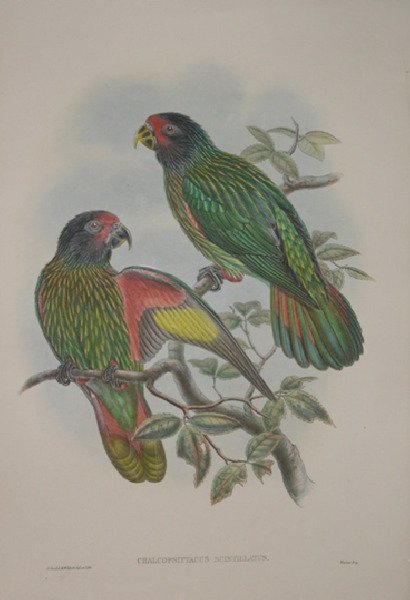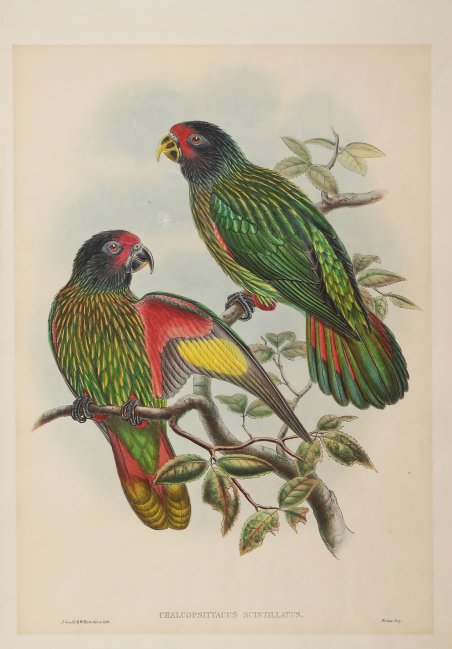Litografia tratta dal famoso ' The Birds of New Guinea and the Adjacent Papuan Islands, ultimo ed importantissimo lavoro di John Gould. L’opera, tirata a soli 250 esemplari, è molto rara; iniziata nel 1875, fu completata da Richard Bowdler Sharpe nel 1888 a causa della morte di Gould. John Gould (Lyme Regis, 14 settembre 1804 – Londra, 3 febbraio 1881) è stato un ornitologo e naturalista britannico. Destinato fin dalla giovinezza a seguire la carriera paterna di giardiniere presso il Castello di Windsor, grazie alle sue precoci conoscenze in tassidermia ebbe l'occasione di entrare a soli 23 anni (1827) nel Museo della Zoological Society di Londra, come conservatore. Gould affinò le sue conoscenze artistiche e scientifiche in ornitologia, consultando i migliori lavori del tempo, in particolari quelli di John James Audubon, William Swainson e Thomas Bewick. Tra il 1832 e il 1837 comparve ' The Birds of Europe, opera in 5 volumi e con ben 448 tavole litografate e colorate a mano. Per la gigantesca impresa Gould si valse della collaborazione della moglie e del celebre poeta e pittore inglese Edward Lear. Una prerogativa che salvò sin dall'inizio Gould dal tracollo economico fu quella di affrontare questi dispendiosi lavori facendoli uscire in sottoscrizione e a fascicoli. Dopo un viaggio in Australia e in Tasmania, pubblicò, con l'aiuto di Elizabeth per i primi volumi, ' The Birds of Australia ' (1840-1848) in ben 7 volumi e 600 tavole, cui seguì tra il 1851 e il 1869 un ' Supplement ' di 81 tavole. Tra il 1862 e il 1873 pubblica ' The Birds of Great Britain, ' in 5 volumi e con 367 tavole. Pubblicò ben 41 libri, per un totale di 2999 tavole litografate e dipinte a mano, quasi tutte dedicate agli uccelli, consacrandosi così fra i più noti ornitologi inglesi dell'età vittoriana Litografia, bellissima coloritura coeva, in ottimo stato di conservazione. Litograph taken form the famous ' The Birds of New Guinea and the Adjacent Papuan Islands, Gould’s last great work. ' With only about 250 sets made, it is amongst the rarest of all Gould's works and was completed after his death by Richard Bowdler Sharpe. ' Sharpe then in charge of the of the bird collection at the British Museum, assumed the authorship halfway through the series in 1881, after the twelfth part had been issued. Sharpe was more than forty years junior to Gould, whom he had meet when he was only fifteen, and they both shared a passionate interest in ornithology. In his last years, although an invalid and often in pain, Gould was always pleased when Sharpe visited him to look at his collection of skins and discuss the latest bird discoveries. John Gould (Lyme Regis, 14 September 1804 - London, 3 February 1881) was a British ornithologist and naturalist. Destined from his youth to follow his father's career as a gardener at Windsor Castle, thanks to his early knowledge in taxidermy had the opportunity to enter at only 23 years (1827) in the Museum of the Zoological Society of London, as a conservator. Gould refined his artistic and scientific knowledge in ornithology, consulting the best works of the time, in particular those of John James Audubon, William Swainson and Thomas Bewick. Between 1832 and 1837 appeared ' The Birds of Europe, ' a work in 5 volumes and with 448 plates lithographed and colored by hand. For this gigantic undertaking Gould availed himself of the collaboration of his wife and the famous English poet and painter Edward Lear. A prerogative that saved Gould from economic collapse from the very beginning was that of dealing with these expensive works by publishing them in subscriptions and in dossiers. After a trip to Australia and Tasmania, he published, with the help of Elizabeth for the first volumes, ' The Birds of Australia ' (1840-1848) in 7 volumes and 600 plates, followed between 1851 and 1869 by a Supplement of 81 plates. Between 1862 and 1873 he published The ' Birds of Great Britain, in 5 volumes and 367 plates. He published 41 books, for a total of 2999 plates lithographed and hand-painted, almost all dedicated to birds, thus establishing himself among the most famous English ornithologists of the Victorian age. Perfect condition. Cfr.


Scopri come utilizzare
Scopri come utilizzare

